Design Talk Series
Design Talk Series
Spoon Carving with Kate Hawes
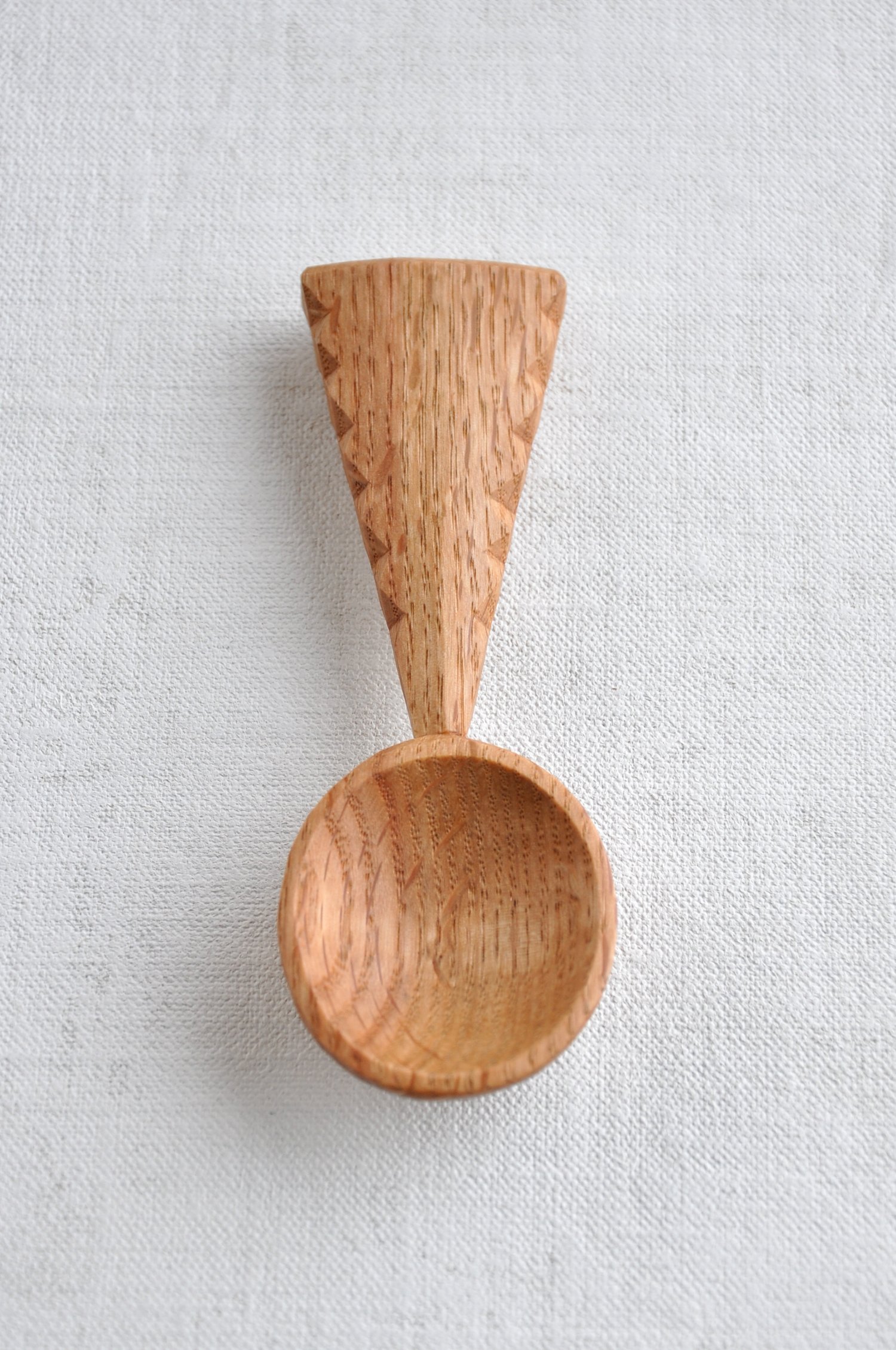
In this hands-on workshop, participants will explore the unique properties of green wood by hand-carving a spoon. Through the act of carving, we will engage with the material’s responsiveness, embracing the process over the final product. Rather than focusing on completing a finished spoon, this session invites participants to slow down, notice, and sense the transformations of the wood as they work.
Kate Hawes has been working with wood for over 25 years, with a practice spanning custom furniture, sculpture, and carving. They hold a certificate in cabinet and furniture making from the North Bennet Street School and an MA in Critical Craft Studies from Warren Wilson College. Kate co-founded and ran a cooperative wood shop in Brooklyn, NY for twelve years and has taught woodworking at institutions including the Craft Students League, Makeville Studio, Peters Valley School of Craft, and the American Folk Art Museum. They completed a residency at Anderson Ranch Art Center and continue to investigate the relationships between craft, materiality, and lived experience.
Julia Norton: Natural Color Materials from the Past to the Present
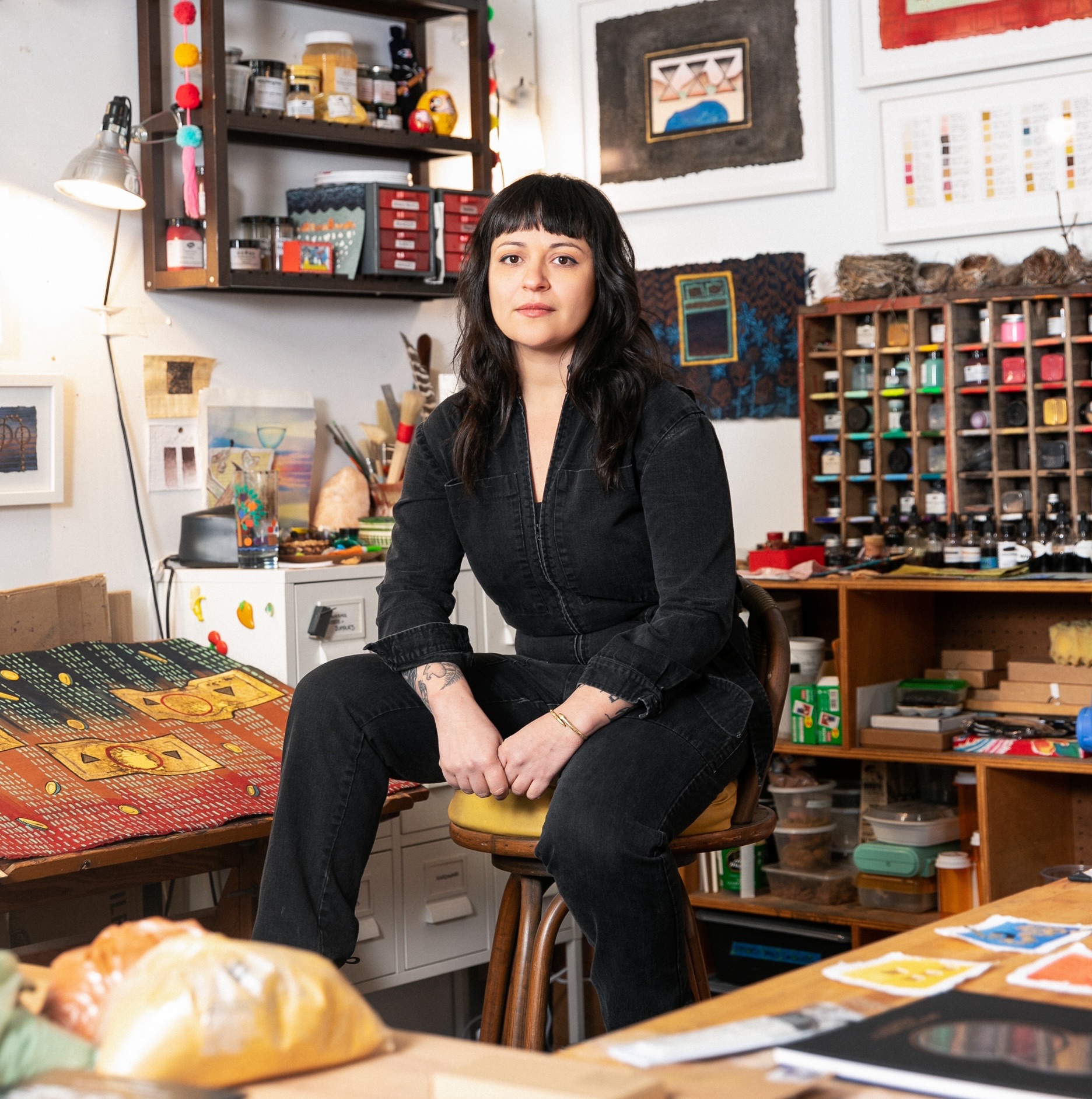
In the first half of the workshop we will learn about historic natural color materials by exploring their origins, cultural implications, and uses dating from the past to the present. In addition to diving deep into these histories we will investigate the work of contemporary artists that consider color materials in their practices. In the second half of the workshop we will look at some of these raw materials first hand, and then learn how to make watercolor paint from scratch using different pigments. We will end with time to explore working with them on paper.
Julia Norton is a multimedia artist, educator, and researcher, with a primary focus on natural materials. She holds a BA from Sarah Lawrence College, an MFA from SUNY Purchase, and an Ed.M from the Harvard Graduate School of Education. Her work has been exhibited at Lyles & King, The Samuel Dorsky Museum of Art, and The Wassaic Project, and she has participated in residencies at The Wassaic Project (Wassaic, NY), Cooper Union (New York, NY), Mass MoCA (North Adams, MA), Banff Centre for Arts and Creativity (BC, Canada), and Pocoapoco (Oaxaca, Mexico). In 2023 she was the recipient of the Rema Hort Mann Foundation Artist Community Engagement Grant. She has previously worked as an educator at institutions such as New Museum, Pioneer Works, and Harvard Art Museums, and currently at Swiss Institute, Dia Art Foundation, and The Isamu Noguchi Foundation and Garden Museum.
Learn more about Julia Norton on her website.
Healthy Building: Carbon and Materials with Parsons Healthy Materials Lab
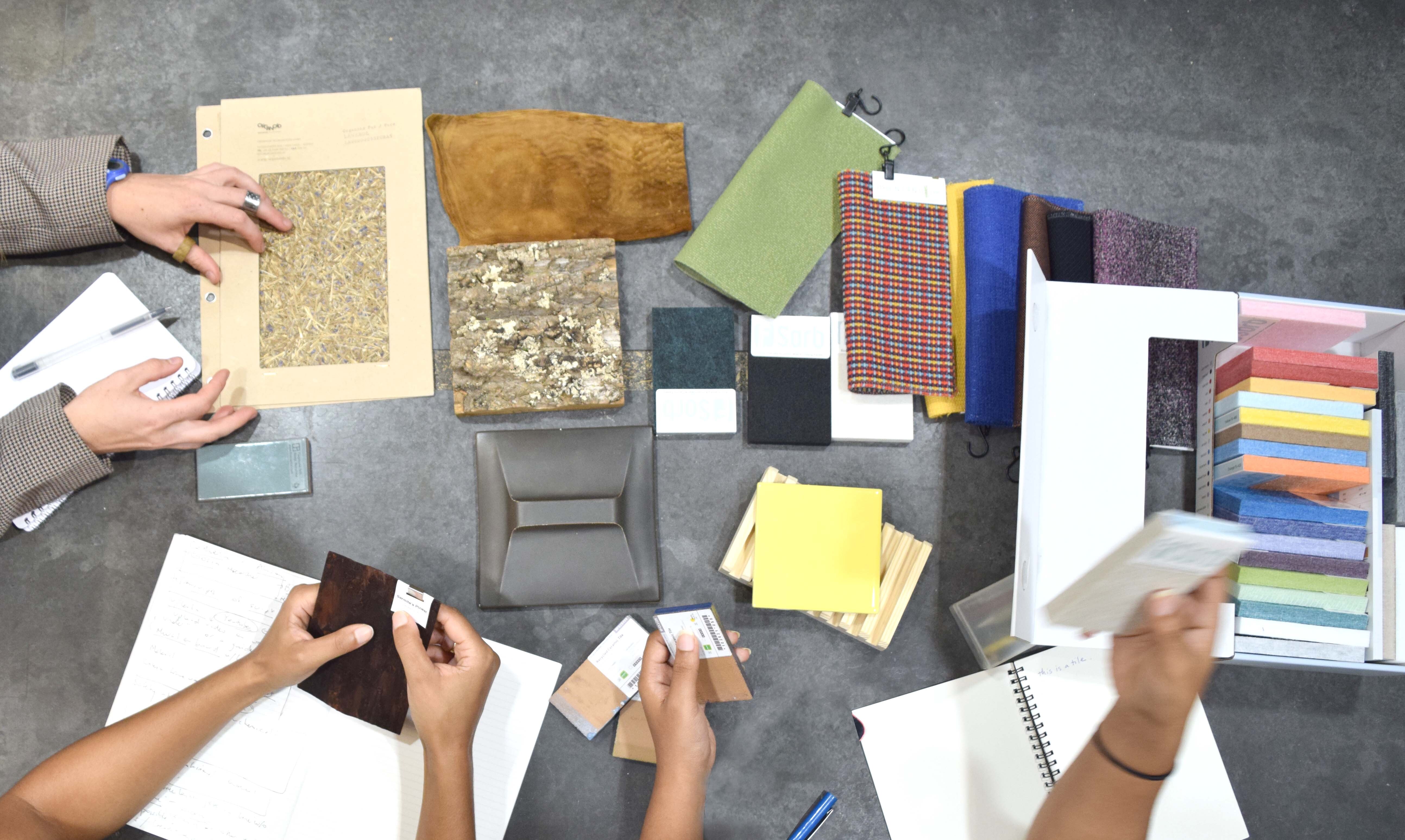
Have you ever wondered what the connection might be between what you design, embodied carbon and toxic chemicals? This hands-on workshop with Cristina Handal and Alison Mears of Parsons Healthy Materials Lab explores the connections between embodied carbon, chemicals, and design materials to learn how to incorporate this knowledge into your design work.
DESIGNING THE FUNGAL CITY - Exploring mycorrhizal networks in the built environment
With restoration efforts presently being conducted above ground in urban environments to enable green spaces to flourish and thrive, we realize that we have been overlooking the critical underground actors that contribute to the wellbeing of our urban ecosystems.
Humans have evicted fungi from the soil. Our obsession towards industrialization and urbanization has led us to build underground infrastructure that has taken the place of soil based microorganisms such as mycorrhizal fungi which are vital to the survival of plant species above ground. How can fungi [re]claim space in the built environment? This talk explores how mycorrhizal networks, and thus plant connectivity can be beneficial to the design of urban ecosystems. This talk is second in this year's Design Talk Series. This talk takes place in person, followed by a Q&A with the audience.
Bio: Vanessa Harden is an artist and designer focused on creating thought-provoking experiences and installations in the built environment. Her current research focuses on how mycorrhizal networks facilitate plant connectivity in cities. She is developing tools and methodologies to help support the fitness and functions of urban ecosystems by incorporating healthy soil fungal communities and networks into the design of urban environments.
She is the founder of Subversive Gardener, an IF Concept Award winning design project turned non-profit organization that focuses on environmental education, design exploration, and public intervention connected to the guerrilla gardening subculture. Vanessa is also the founder of Wild Flag Studios, a design studio that creates interactive sculptures and produces art installations for clients worldwide. She has taught as well as served as guest critic at numerous institutions. While teaching at New York University, she established a research group called IDM.Grow which was dedicated to introducing students to agricultural technologies and their practical applications. She has delivered numerous talks about her work, addressing how public interventions act as vehicles that draw awareness to timely social and environmental challenges. Vanessa and her work have been featured in publications including Vogue, The Guardian, Wired, Bloomberg BusinessWeek, Vice, and others, and on networks including CNN and the BBC. Her work has been shown in multiple exhibitions including at the Venice Biennale, the Victoria and Albert Museum, and the Royal Institution. She holds three art and design centric degrees from the Ontario College of Art & Design (BDes), MIT Media Lab and the Royal College of Art (MA RCA). Vanessa is currently in the Doctor of Design program (DDes) at the Harvard Graduate School of Design.
Backstrap Weaving using Zero Waste Fabrics with Cynthia Alberto
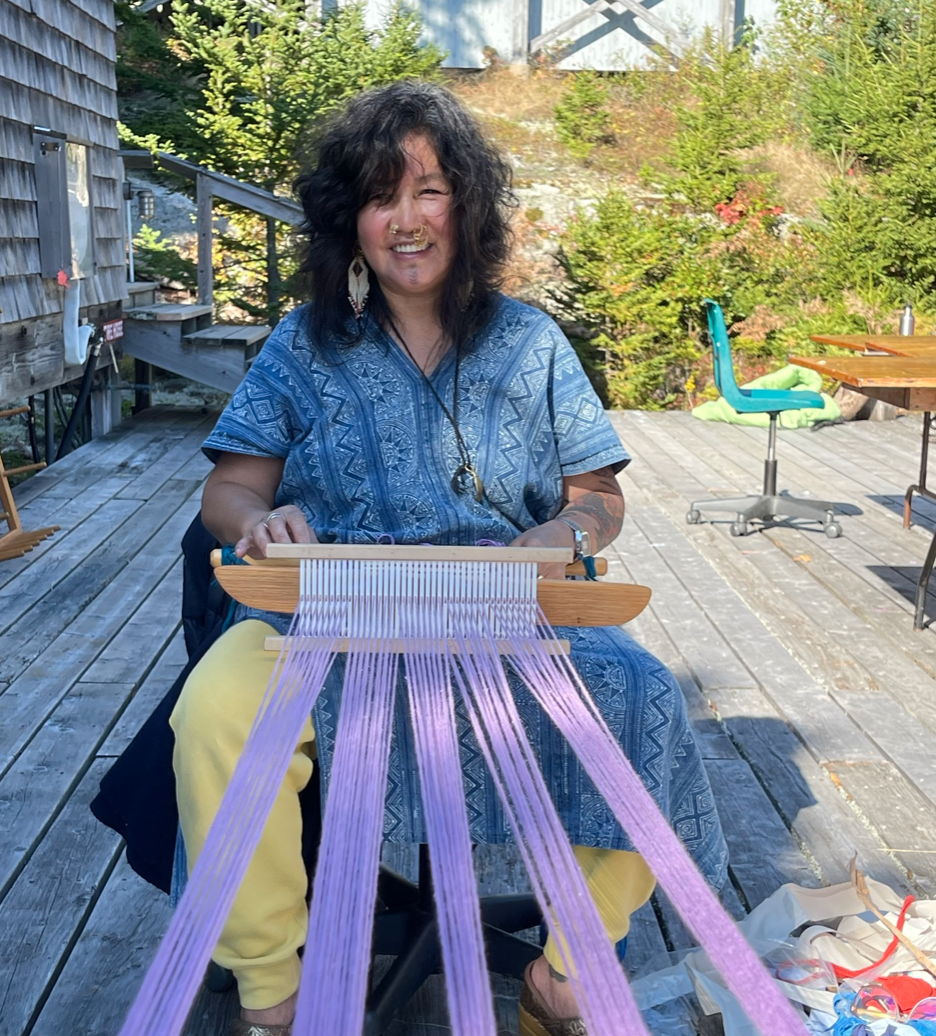
The founder and director of Weaving Hand, Cynthia Alberto, will teach “Back-strap Weaving.” This workshop will introduce participants to the history of back-strap weaving, an ancient yet globally practiced tradition. Using modern back-strap looms, participants will develop woven projects with an emphasis on sustainable, zero-waste weaving. Three techniques will be harnessed during this workshop and participants will walk away confidently knowing how to practice: plain weave, interlocking, and vertical stripes. In addition to developing their tactile and woven skills, participants will observe and study samples of back-strap looms and fabrics from various cultures (the Philippines, Indonesia, Guatemala, Mexico, and Peru.) This event is first in this year's Design Talk Series.
Bio: An artist, designer, and founder of the Brooklyn-based Weaving and Healing arts studio Weaving Hand, Cynthia Alberto seeks to bridge traditional and contemporary weaving techniques, drawing inspiration from ancient communities of Europe, Asia, Latin America, and Africa. Her artwork, performances, and public weaving projects honor traditional and artisanal techniques while also incorporating unconventional materials and a zero-waste philosophy. Throughout her artwork and teaching, Alberto continuously explores the many intersections between weaving and healing, as well as craft and sustainability. Inspired by her studio practice and teaching, Cynthia continuously explores diverse relationships between weaving, healing, inclusive art, craft, and sustainability.
In 2014 at Weaving Hand, Cynthia developed "Weaving Together": a series of ongoing collaborative weaving events that focus on healing the community and create interpersonal relationships through the act of weaving together. Members of different communities are invited to bring recycled materials to weave alongside their neighbors. "Weaving Together" events were held at Museum of Arts and Design, Cooper Hewitt, Barnard College, Pratt Institute, Earth Day Initiative, Pioneer Works, Queens Museum, Ace Hotel, Haystack Mountain School of Crafts and Bldg 92 Brooklyn Navy Yard.
Cynthia is also a recipient of the Dan River Weaving Award (1998); Peters Valley Craft Center Art Educator Scholarship (2008); The Pollock-Krasner Foundation Grant (2009); Museum of Arts and Design - Open Studio Artist Residency (2008 & 2018); and Ace Hotel Artist in Residence (2015 - 2016), Hunterdon Museum (2020), Hancock Shaker Village (2021), Artshack Brooklyn, Artist in Residence (2021) Since 2009, Cynthia has been a Resident Artist at League Artists Natural Design; a studio and gallery in Brooklyn, NY that features work by adult artists living with disabilities.
Cynthia was featured in the Cooper Hewitt Design Dictionary (2014), where she demonstrates the process of weaving. She has conducted lectures and workshops at the Queens Museum of Art (NY), Tyler School of Art, Pratt Institute, Fashion Institute of Technology, Brooklyn Fashion and Design Accelerator (BFDA), Sheridan College Textiles Department, and Kapisanan Philippine Centre for Arts and Culture. Cynthia is a graduate of the Fashion Institute of Technology with a BFA in Textile Surface Design and exhibits her work worldwide.
Creative Circuits with Ana Mengote Baluca
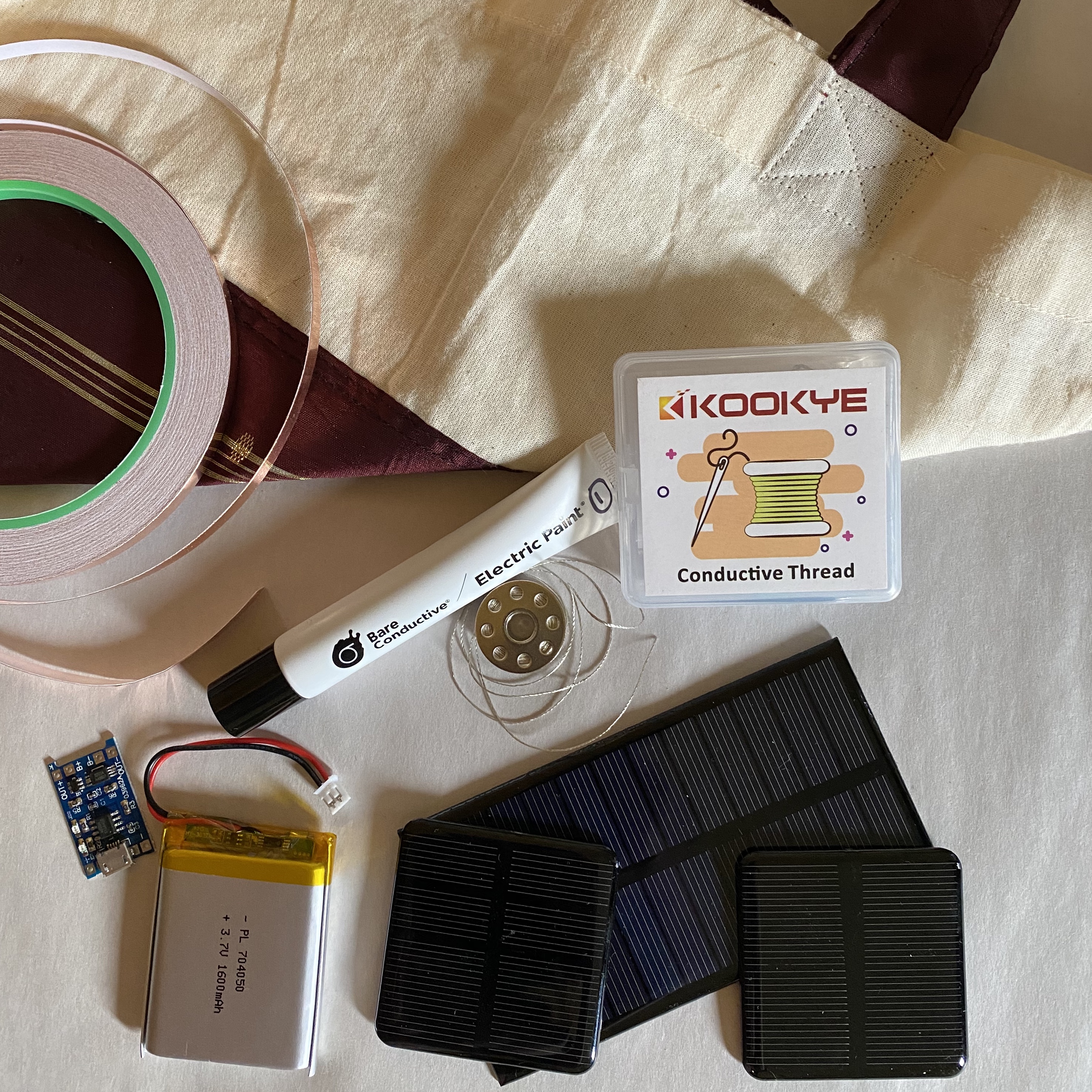
The aesthetics of circuits are not usually its most appealing feature, which is why they are often traditionally hidden. But with the advent of new conductive materials, it is now easier to create beautiful circuits that you can display and even wear! Ana demonstrates how to add a solar charger to your tote bag, with circuits uniquely drawn with clever materials. A lesson about circuits and exploration of different conductive materials such as conductive thread, copper tape, and conductive ink precedes object creation. Incorporating what was learned, participants draw their own circuitry to create a unique solar-powered tote bag.
Bio: Ana Mengote Baluca is a generalist industrial designer, working on using design as a tool to pursue a more equitable society. She is motivated and inspired by solving meaningful problems and has worked in different industries such as wearable technology, IoT, jewelry, furniture houseware, and wayfinding. Experimenting with and hacking materials is an important part of her process. When she’s not in her studio making jewelry, textiles, or whatever she may come up with, she teaches sophomore design students at the Pratt Institute.
Economies of Breath with fields harrington
fields harrington examines the social implications for a science of work and the biography of the spirometer. The spirometer’s measure of lung capacity is inextricable from the racializing surveillance of statistical law, by which entropy, energy and research into fatigue all have contributed to the creation of categories of difference and determined values of vitality.
Bio: fields harrington (b. 1986 Sacramento, CA; based in Brooklyn, NY) is an interdisciplinary artist whose practice considers the blurring of boundaries between poetics and science. His work revisits the history of western empiricism and scientific systems, addressing legacies of violence as well as the enmeshment of science, racism, and ideology. By appropriating scientific processes and subverting their grammar, his desire is to relieve the black subjective experience from a legacy of historical violence. The weaving of artistic and scientific languages deployed in his work proposes the formation of a relational knowledge that recodes science through poetics.
fields received his BFA from the University of North Texas and his MFA from the University of Pennsylvania. He was a participant in the Whitney Independent Studio Program (2019-2020).
Learn more about fields on his website.
Hack for Access with Open Style Lab
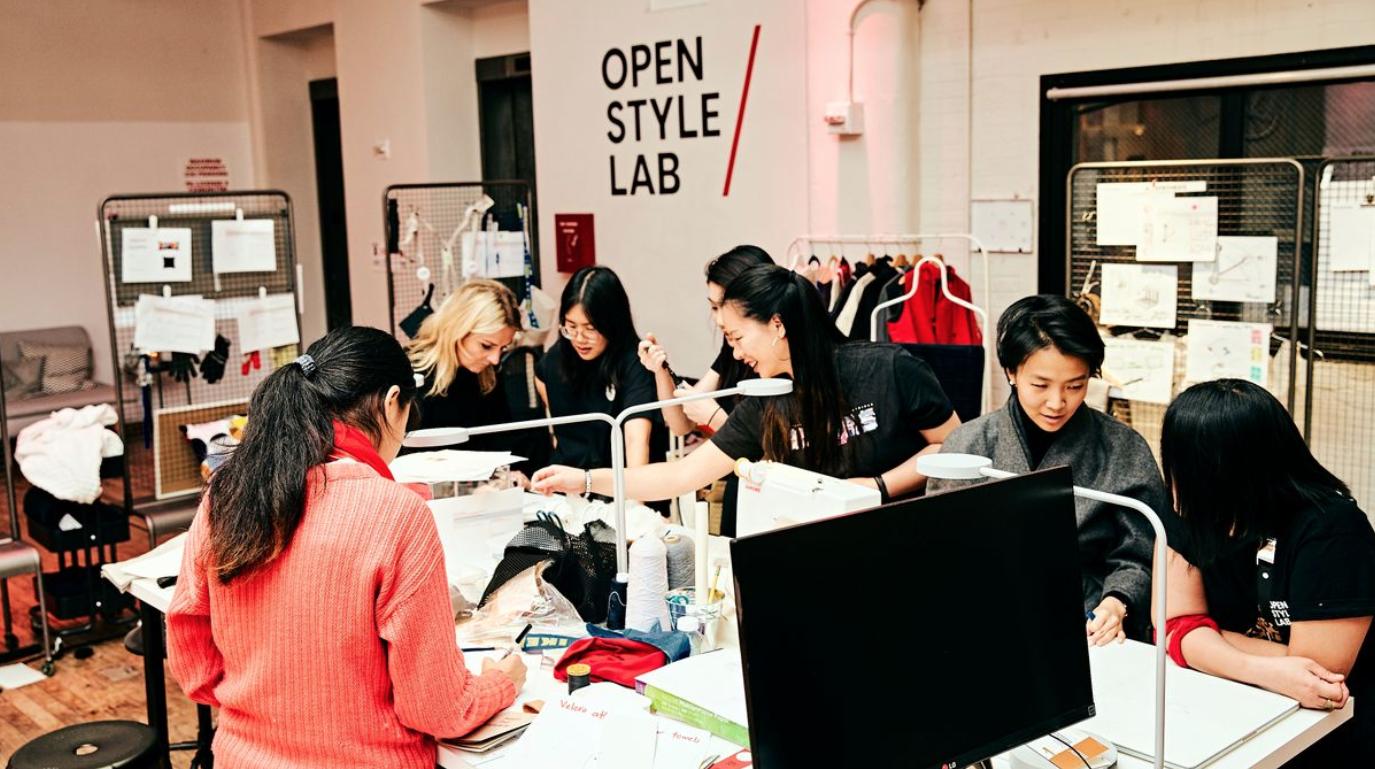
Open Style Lab (OSL) is a National Design Award Winning nonprofit organization committed to making style accessible for everyone, regardless of their cognitive and physical abilities. The Hack for Access workshop by OSL will kick off with a presentation on what is inclusive design, introducing the organization's approach and sharing sample work. It will continue with participants having an interactive session on tools used in the field of fashion and various ways to make them accessible, working with OSL's Hackability Kit. The session will wrap up with team ideation on design tools in how they might be more accessible.
How to Grow a Field

Field collaborators Supermrin, Jil Berenblum, and Xenia Adjoubei lead a hands-on workshop transforming grass clippings into a sustainable and structural bioplastics material.
Field is a bio-arts laboratory and research space that creates new discourse around our relationships with land and nature to rethink the homogeneity, order, and control present within the built environment. Field collaborators are biohackers, artists, engineers and architects who open source their findings to share recipes, fabrication processes and tools for working with new experimental and sustainable materials. “How to Grow a Field?” is a 2.5 hour workshop where participants will learn to make Field’s new grass-based bioplastic and experiment with a variety of fabrication processes with this material. In the process, Field will discuss the opportunities and challenges of working with biomaterials, and introduce participants to their ongoing research with robotic fabrication techniques for these new materials.
Field is a collaborative long-durational art project, presently on residency at Governors Island in New York. Field members form a vast network across the globe and include Jil Berenblum, Ane Gonzalez Lara, Jessica Fernonani Cooke, Xenia Adjoubei, Supermrin and many others. Field was founded in 2018.
Bios: Supermrin is an Indian artist working at the intersections of architecture, art, and design. Through a research-led, speculative, and site-specific practice, she creates installations and environments that seek to reconsider the values that spaces offer, and the ways through which they mediate human relationships. She is interested in conceptions of reality, pleasure, and nature within eastern practices. Supermrin is a Visiting Artist at the Graduate Architecture and Urban Design (GAUD) Program at Pratt Institute, and an Assistant Professor of Art at the School of Art, University of Cincinnati. She holds an MFA degree from the San Francisco Art Institute, California and an undergraduate degree in Exhibition Design from the National Institute of Design, India. Her work has been exhibited at venues across the United States and beyond, including the Venice Biennale 2021, the Headlands Center for the Arts, The Old San Francisco Mint, Root Division, The First Presbyterian Church of New York, ChaShaMa Space, and the India Habitat Center in New Delhi. Supermrin founded Streetlight in 2017 as a critical spatial research and design laboratory for decolonizing public space. She is presently engaged in public arts projects in Oakland, California, and on Governors Island, New York.
Jil Berenblum is an industrial designer at the Cartier Innovation Lab and a biomaterials researcher with Expressive Matter at Genspace. She is working on building a set of skills that both understand the needs of existing commercial fabrication spaces, but can also answer the urgency with which we need to integrate more sustainable and responsible practices in design.
Xenia Adjoubei is the director of ASWStudio, founder of Nikola-Lenivets Classroom, a Fulbright Visiting Scholar at the Inclusive Ecologies Incubator at the Pratt Institute, New York, and head of an architecture practice which specialises in culture and education. Xenia's research is on Environmental Diplomacy and Climate Justice with a focus on migration, informal economies and their impact on the environment, which is showcased at biennales and exhibitions internationally. She directs the Nikola-Lenivets Open Classroom at the largest art park in Europe, where she leads short courses and research projects on Art as Labour in a Post-work Future and the New Rural condition, which have participated in conferences and exhibitions including the Oslo Architecture Triennale 2019, in collaboration with the Global Free. She teaches an MA studio with Alejandro Haiek at Umea University, Sweden.
Learn more about Field on their website.
Holograms & Haptics at the Limit of Sight & Sound with Constantina Zavitsanos
Constantina Zavitsanos discusses their work in waves from holography to haptic sound, and the cacophony of incapacity and interference as shifting sites for speculation and sociality beyond scarcity.
Bio: Constantina Zavitsanos works in sculpture, performance, text, and sound to elaborate debt, dependency, and means beyond measure. Zavitsanos has exhibited at the New Museum, Brooklyn Museum, Artists Space, The Kitchen, and Participant Inc (New York), at Arika (Glasgow), and HKW (Berlin). With Park McArthur, they wrote “Other Forms of Conviviality” in Women & Performance (Routledge), and “The Guild of the Brave Poor Things” in Trap Door: Trans Cultural Production and the Politics of Visibility (MIT Press). Zavitsanos is the 2021 recipient of the Roy Lichtenstein Award from the Foundation for Contemporary Arts and the 2022 Keith Haring Fellow in Art & Activism at Bard College.
Learn more about Constantina Zavitsanos on their website.
Consentful Software Design with Xin Xin
The Barnard CSC and Design Center hosted interdisciplinary artist and community organizer Xin Xin, who demonstrated Togethernet, an open-source software that invites groups of 10 or fewer participants to build community archives through practices of consent.
Consentful Software Design is a lecture that breaks down the design process of Togethernet, an open-source software that invites groups of 10 or fewer participants to build community archives through practices of consent. Designed around the ethos of data transparency and consent, Togethernet's goal is to transform digital rights policies such as the right to be forgotten into an embodied practice through reimagining software architecture and user experience. This tool and initiative stands on the shoulders of Consentful Tech Zine by Una Lee and Dann Toliver and Design Justice Network Principles — by considering transparency and consent every step of the way, the source code serves as both a technical and a moral document that seeks to uncover systems of power and uncertainties embedded in network technologies.
Bio: Xin Xin is an interdisciplinary artist and community organizer currently making socially-engaged software that explores the possibilities of reshaping language and power relations. Through mediating, subverting, and innovating modes of social interaction in the digital space, Xin invites participants to relate to one another and experience togetherness in new and unfamiliar ways.
As an artist, their work has been exhibited internationally at Ars Electronica, DIS, Gene Siskel Film Center, Tiger Strikes Asteroid and Machine Project. Most recently their project Togethernet was selected for the 2020 Rapid Response for a Better Digital Future Fellowship at Eyebeam. They are also an 2021 Art of Practice Fellow and Community Leader at the Sundance Institute. As an organizer, Xin co-founded voidLab, a LA-based intersectional feminist collective dedicated to women, trans, and queer folks. They were the Director for Processing Community Day 2019 and they serve on the advisory board for the Processing Foundation.
Born in Taipei, Taiwan and raised in Massachusetts, United States. Xin identifies as a cross-cultural, non-binary, anarcho-feminist and will probably always have a genre-nonconforming practice. Xin received their M.F.A from UCLA Design Media Arts and teaches at Parsons School of Design as an Assistant Professor of Interaction and Media Design.
Learn more about Xin Xin on their website and Togethernet here.
Activating the Archive
Bio: Stephanie Santana is a textile artist, fine art printmaker, illustrator and designer based in Brooklyn, NY. Through the use of archival family photographs and documents, her work explores themes of interiority, identity and cultural preservation, traversing the space between memory and the physical evidence of Black life.
Santana's work has exhibited nationally and is currently held in both private and public collections, including Getty Research Institute and Smith College Museum of Art. Additionally, her work has been featured in publications such as Pressing Matters, Printmaking Today (Journal of the Royal Society of Painter-Printmakers) and SPOOK Magazine. Her illustrations are featured in the film An Oversimplification of Her Beauty (The Criterion Collection, Official Selection of the 2012 Sundance Film Festival), and have been commissioned by clients such as Apple and Nike. She currently serves as Communications Director for Black Women of Print, a homeplace for Black women printmakers.
In this talk: Drawing upon the Akan philosophy of Sankofa, which translates to "it is not taboo to fetch what is at risk of being left behind," we will consider the archive as a dynamic tool for preservation and self-determination. Textile artist and printmaker Stephanie Santana will share an overview of her current practice using archival family photographs, as well as a survey of public resources and archivists working with both traditional and alternative methods. We'll end the discussion with tips for maintaining your own archive and a Q+A session.
Mediation by Design
During this talk, Lani Adeoye will discuss Studio Lani’s Journey and using design as a mediation tool to seek harmony and merge seemingly different worlds.
Bio:
Lani Adeoye is a Nigerian Canadian artist and designer. She is driven by conceptual curiosity and cultural expression coupled with a thirst for innovation. She uses design as a mediation tool; fusing tradition and modernity, merging Art, Craft & Design; whilst expressing intangible cultural concepts.
Prior to studying at Parsons - 'The New School,' Lani worked as a Management and IT Consultant to Fortune Global 100 clients; following her graduation from McGill University, where she earned her Bachelor's degree in Commerce. Her versatility as a designer is a testament to her eclectic roots and diverse life experiences, having lived in four major cities, namely Lagos, Montreal, Toronto, and New York.
As a design consultant, she has developed concepts for various brands including YouTube, Bacchus and NetGear. Conceptualizing unique products and experiences with immense intangible value.
Most recently, Lani was selected by Elle Décor as part of its ‘Women of the World: 75 Global Female Designers Worth Celebrating.’ Dwell Magazine also included her in its annual list of ‘Young Guns – New Designers Making Waves.’ And in 2017, she won the Wanted Design’s Launch Pad Furniture Competition in New York City.
Studio:
Studio-Lani creates sculptural lighting and furniture pieces, that express an organic rhythm and a sense of visual harmony.
Driven by conceptual curiosity, handmade craftsmanship and cultural preservation, her pieces celebrate West African elegance with a contemporary sensibility. In addition, as a conscious design studio, she works closely with various artisans in Nigeria and strives to positively impact the community. Studio-Lani’s pieces has been featured in Architectural Digest, Design Milk, Elle Decor, Vogue, Design Indaba and Dwell amongst other publications.
Studio-Lani is on a journey to redefine heritage whilst creating pieces today for your tomorrow.
Learn more about Studio Lani through the Studio Lani Website or on Instagram.
Sustainability Through Conscious Design: The Story of DEMESTIK
In this Design Talk, Reuben shares his story, design process, sustainable practices and current strategies.
BIO:
Reuben Reuel /pronounced Roo-buhn Roo-el/ is the designer & creative director of DEMESTIK. A native of Virginia Beach with an ancestry from West Africa, Reuben journeys through the past, present, and future to fabricate colorful beauty and share it with the world.
DEMESTIK /pronounced domestic/ is a sustainable lifestyle brand with products ethically made on-demand. Every item is crafted to fit your figure and lifestyle. Our versatile and effortlessly chic designs will encourage you to discover the true feeling of self love and real happiness; clothing that enhances your confidence and welcomes compliments to you from yourself and the world. We believe how you feel in this life is significant. Define the feeling and design your life with DEMESTIK.
Find out more about DEMESTIK on Youtube or on Instagram
Melt & Pour Soap Making with Christine Nixon
Soap is something we all use several times a day, and even more so this year. The ingredients in the soap we use is often a mystery which requires a Google search to solve. There are also a lot of unnecessary chemicals in the soap we use.
In this workshop, Christine will talk about her journey into soapmaking as a career, a brief history of soap making, and will teach you a simple process of making soap with your choice of essential oils and food-grade color dyes. To follow along at home, you can purchase the supply kit used in the workshop.
Bio: Christine Nixon is a G.I.A Graduate Gemologist and bakery entrepreneur that became a skin and hair care, business owner. Christine initially made soap and shampoo for her sensitive skin and dry hair. Retail products worsened the condition of her skin and hair. Organic products were not readily available, too expensive, or didn’t meet all of her quality standards. Making effective products out of necessity birthed Bathing Spirits Inc.
More about Christine through the Bathing Spirits Website, or on her Instagram.
In Conversation with Willem Henri Lucas
In this talk Lucas will be showing an overview of his design career starting in art school, his freelance practice in Amsterdam, his move to LA, and ending with the last 4 years of work, and latest book project.
Bio: Willem Henri Lucas studied at the Academy of Visual Arts in Arnhem in the Netherlands and did his post-academic studies at the Sandberg Institute (Rietveld Academy) in Amsterdam. After his studies, Lucas worked as an independent designer in Amsterdam. From 1990 to 2002 he served as a professor and chair of the Utrecht School of the Arts’ Graphic Design department. In 2004 Lucas moved to Los Angeles as a visiting lecturer at UCLA Design Media Arts, and is a tenured professor since 2007. From 2007 to 2014 Lucas was the department chair, and currently is a Senate faculty member and Professor Step 6.
His work is based in the field of Culture and the Arts. In 1998 he designed a series of 20 holiday postage stamps for the PTT (Dutch Post and telecom company). He won several (book) design awards in the Netherlands as well as in the US. Primarily a book designer (exploring sensibility of printed matter; in material as well as content) most of his projects are self-initiated and he is (co-)editor, producer, as well as a designer. Lucas is interested in addressing social issues and bringing design back ‘to the street,’ and ‘humanity’ back into design, encouraging future designers to be a valuable part of their communities. His body of work deals with issues of ‘war’ and ‘love’, and ‘the human condition.’
Deconstructing Design
In this talk, Elanur Erdogan will share the story of her career as a designer. As a designer Elanur constructs literal methods to communicate abstract ideas. She will dissect her distinct creative process and how she takes an idea and constructs it into a physical product. This discussion will be followed by a demonstration of how she has come to naturally dye her textiles at home with repurposed materials. The talk will conclude with an audience Q&A.
Bio: Elanur is a designer, stylist, and artist born and raised in New York. She graduated from Parsons New School for Design with BFA in Fashion Design. From then went on to work at Iris van Herpen in Amsterdam where she was inspired to build her own artisanal womenswear brand DOBS NY upon her return to New York in 2015. The brand gained recognition through its approach solely creating with repurposed materials down to personal food scraps that she repurposed to manipulate the garments. More recently Elanur has expanded her horizons as a stylist in fashion/entertainment, working with costume designers such as B. Akerlund and Ane Crabtree. As a craftsman herself, her passion lies in supporting the work of independent artists and designers.
More about Elanur, and her Instagram.
Methods and Mediums: Using Collage for Art & Editorial Illustration
From an ever-evolving art form to a method of storytelling, collage is a medium with limitless applications. Artist, illustrator, and art director Emily Haasch will walk through their ongoing practice as a collage artist, and how it translates to the practice of editorial illustration via perception, conceptual thinking, and journalistic storytelling.
Bio: Emily Haasch is an artist, illustrator, and designer residing in Brooklyn by way of both San Francisco and Chicago. Their work supports artists and creative communities through art direction and design for maker marketplaces (Etsy), games (Cards Against Humanity), musicians (Splice), art platforms (Electric Objects), and many more. Editorially, Emily has had the honor of illustrating stories for clients such as The New York Times Magazine, The Atlantic, The New Yorker, MIT Technology Review, GOOD Magazine, Vox, Medium, and others. In addition to a professional practice, Emily is also a working artist and master of side projects, ranging from textiles to low-fi websites.
More about Emily, and their Instagram.
Bookbinding at Home
During this workshop, Erin will teach you how to make different bookbinding structures and stitches from her home letterpress and bookbinding studio. You'll learn pamphlet and stab binding, and some variations. We'll also look at examples and talk about how you can use bookbinding in your design practice. Everyone who zooms in will make at least one book during the session. If you’ve ever been curious about how to make a book, this workshop is a great place to start.
Materials
- A blunt butter knife (Bonus: bone folder: I personally prefer pointed: the best tool!)
- Needles of various sizes (bonus: curved needles)
- Scissors (Optional but useful: cutting mat and x-acto knife)
- Ruler
- The fattest needle you have, an ice pick, or an awl
- Clothespins, bulldog clips, or paper clips
- Dental floss, embroidery floss, or thick thread and a beeswax candle (bonus: linen thread and a beeswax candle)
- Lots of paper and some thin card (a cereal box or two would work)
Bio: Erin is an artist from Brooklyn who currently lives in Aotearoa (New Zealand). She works with place, memory, democratizing processes, and pop culture. Her favorite mediums are drawings, books, prints, and crazy schemes. She holds an MFA from the University of Auckland and runs Tāmaki Makaurau's very own zine vending machine.
More about Erin, and her Instagram.
One Report: Building Community Through Digital Publishing
Watch Anisa Tavangar's (BC ’18) workshop and Q&A on creating niche media, exploring why community-driven publications matter and how to set yourself up for success when starting a digital publication. Hear about how to stay organized, avoid burnout, build a community around something you care about, and utilize the tools available to realize your vision. One year into One Report, Anisa’s own publication that explores facets of spirituality, the project has amassed 21 issues featuring over 100 contributors from over 30 faith backgrounds.
Bio: Anisa Tavangar is a writer, editor, and creative producer in Brooklyn, New York. She works at the intersection of art, justice, and spirituality, writing and producing content for arts organizations, galleries, artist studios, and spiritually-driven initiatives. She is the founding editor of One Report, a publication that offers space for learning and reflection among people of all beliefs and backgrounds. Anisa has worked with Shondaland, Refinery29, Vogue, Teen Vogue, For Freedoms, Google Earth, issuu, and others.
More about One Report, and it's Instagram!
Creative Iteration: Pursuing Art and Design Post-Grad
During this talk, Daniela will discuss topics including her path from Barnard into the world of professional architecture, looking for and applying to jobs, and being an entry-level designer, particularly at small firms. Topics will include the relationship between personal ethics and one's professional career, navigating different management styles, advocating for oneself in the workplace, the importance of having a personal creative practice separate from a 9-5 office job, and how work and hobbies have changed in the wake of the coronavirus pandemic. There will be opportunities for audience Q&As throughout the talk.
Bio: Daniela is an architectural designer and illustrator based in Seattle, Washington. She received her B.A. in Architecture from Barnard College in May 2019, where she was also a staff illustrator on the Columbia Daily Spectator and frequented the Design Center as much as possible. She currently works at VELOCIPEDE Architects, a small firm in Seattle's Belltown neighborhood that specializes in environmentally conscious design of single-family and multifamily homes, as well as retail spaces. When she is not working, she enjoys drawing, reading, cooking, and experimenting with backgrounds on Zoom.
More about Daniela, and her Instagram.
The Design Talk Series is an ongoing program of talks and workshops by invited artists, designers, and educators. These practitioners often uplift aspects of our mission including design justice, sustainability, and inclusivity.